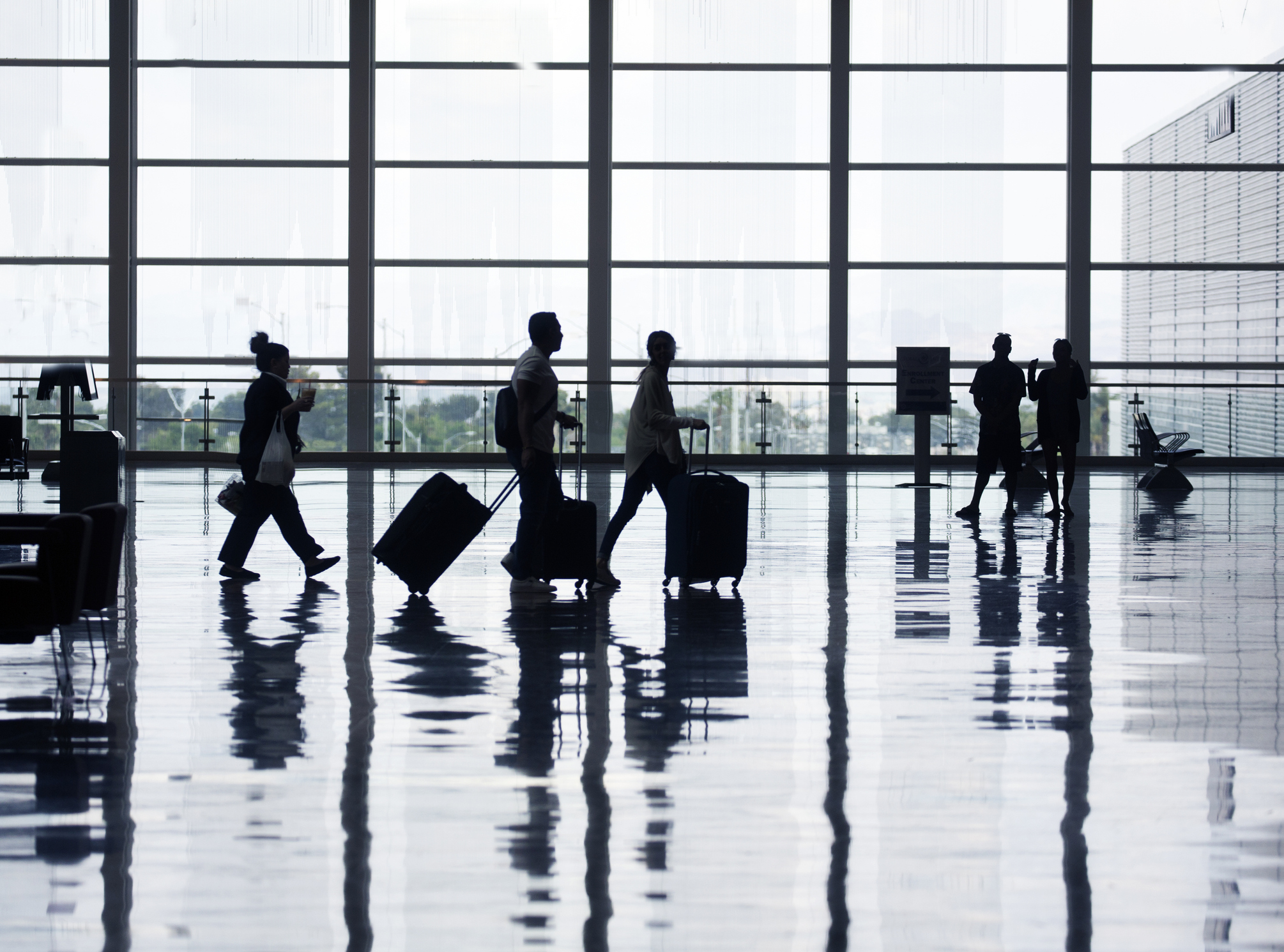A Plan To Hold Airlines Accountable For Damaging Wheelchairs Doesn't Go Far Enough, Groups Say
The proposal would make it easier to hold airlines accountable for mishandling wheelchairs and better protect people at airports and on planes, DOT says.


Profit and prosper with the best of Kiplinger's advice on investing, taxes, retirement, personal finance and much more. Delivered daily. Enter your email in the box and click Sign Me Up.
You are now subscribed
Your newsletter sign-up was successful
Want to add more newsletters?

Delivered daily
Kiplinger Today
Profit and prosper with the best of Kiplinger's advice on investing, taxes, retirement, personal finance and much more delivered daily. Smart money moves start here.

Sent five days a week
Kiplinger A Step Ahead
Get practical help to make better financial decisions in your everyday life, from spending to savings on top deals.

Delivered daily
Kiplinger Closing Bell
Get today's biggest financial and investing headlines delivered to your inbox every day the U.S. stock market is open.

Sent twice a week
Kiplinger Adviser Intel
Financial pros across the country share best practices and fresh tactics to preserve and grow your wealth.

Delivered weekly
Kiplinger Tax Tips
Trim your federal and state tax bills with practical tax-planning and tax-cutting strategies.

Sent twice a week
Kiplinger Retirement Tips
Your twice-a-week guide to planning and enjoying a financially secure and richly rewarding retirement

Sent bimonthly.
Kiplinger Adviser Angle
Insights for advisers, wealth managers and other financial professionals.

Sent twice a week
Kiplinger Investing Weekly
Your twice-a-week roundup of promising stocks, funds, companies and industries you should consider, ones you should avoid, and why.

Sent weekly for six weeks
Kiplinger Invest for Retirement
Your step-by-step six-part series on how to invest for retirement, from devising a successful strategy to exactly which investments to choose.
The Biden administration's recent move to mitigate less-than-stellar conditions for wheelchair users at airports has been long in coming and does not go far enough, two advocacy groups say.
The proposed rule would mark the biggest expansion of rights for passengers with wheelchairs since 2008, Department of Transportation (DOT) Secretary Pete Buttigieg said in a statement. It would make it easier to hold airlines accountable for mistreating wheelchairs and better protect people at airports and on planes, he said.
“There are millions of Americans with disabilities who do not travel by plane because of inadequate airline practices and inadequate government regulation, but now we are setting out to change that,” he said. “This new rule would change the way airlines operate to ensure that travelers using wheelchairs can travel safely and with dignity.”
From just $107.88 $24.99 for Kiplinger Personal Finance
Become a smarter, better informed investor. Subscribe from just $107.88 $24.99, plus get up to 4 Special Issues

Sign up for Kiplinger’s Free Newsletters
Profit and prosper with the best of expert advice on investing, taxes, retirement, personal finance and more - straight to your e-mail.
Profit and prosper with the best of expert advice - straight to your e-mail.
The proposal seeks to take action in several ways including by:
- Penalizing airlines for mishandling wheelchairs as automatic violations of the Air Carrier Access Act and holding them accountable when a passenger's mobility device is damaged.
- Providing more training for airport employees who assist passengers with mobility disabilities and in handling wheelchairs to ensure more prompt and effective assistance.
- Improving standards both on-board planes as well as when it comes to informing passengers about the whereabouts of their equipment when getting on and off the plane.
Just the beginning
Air travel for those who use wheelchairs can be notoriously perilous, as highlighted in a New York Times report last June. There has, however, been a push toward creating more accessibility at airports and in other industries.
But the government's proposal is just the beginning of the work that needs to be done to ensure safety and comfort for all travelers, Maria Town, CEO and president of the American Association of People with Disabilities, told Kiplinger.
"Right now, many disabled people choose not to fly because the risk of damage to the devices they rely on is too great," she said. "For those who do fly and have their wheelchair or scooter damaged in the process, traveling can result in injuries, high expenses and long wait times to fix the mobility aid — and even death."
The Biden administration's proposed rule-making to increase the safety and dignity of air passengers with disabilities "is both long overdue and an exciting point of progress in the ongoing fight for disability rights and inclusion," Town said. The training requirements, including requirements around repairing wheelchairs, as well as providing loaner chairs have the potential to improve the experiences of people with disabilities when they fly, she added.
Other steps that could be taken
Town also offered some insight into how the proposal could be more effective. Wheelchairs are not the only devices that become damaged or broken when disabled people fly. She said the administration should go beyond wheelchairs and consider other devices such as breathing machines and speech devices.
"The disability community is incredibly diverse, as are the devices we rely on to meet our day-to-day needs," Town said.
The administration's proposal accomplishes a goal of drawing attention to the barriers disabled airline passengers face but it does not go far enough, said John Morris, founder of wheelchairtravel.org, a nonprofit that aims to provide a wheelchair to people who who can't afford them.
"Through the proposal, the DOT will aim to codify long-held expectations, reiterating the responsibilities of airlines to repair damaged mobility equipment and adequately train their employees and contractors," Morris told Kiplinger. "Without a firm commitment to pursue enforcement action in response to violations, the updated regulations are unlikely to have any impact on the passenger experience."
Morris said it has been more than 30 years since the passage of the Air Carrier Access Act, but violations remain commonplace "and the DOT has done little to guarantee the civil rights of disabled passengers."
He called accessibility regulation "reactionary," and said that air travel "unnecessarily remains the least accessible form of transportation for wheelchair users."
Steps others are taking
In January, AccessibleGO,a travel search engine site catered to travelers with disabilities expanded its features to include options such as equipment rentals, flights, rental cars with hand controls, wheelchair van rentals, mobility rentals and concierge ride services for wheelchair-accessible vehicles.
The site also serves as a resource for travelers to find discounts on travel and engage with a community to discuss the level of accessibility of various cities and travel destinations.
In a separate move, Starbucks recently began to create a more accessible environment in all of its new stores. It recently opened a newly-designed store concept, complete with wider doors, portable, digital menus and more. You can take a virtual tour of the coffee chain's Washington, DC store, which was recently built using the company's inclusive spaces framework.
RELATED CONTENT
Profit and prosper with the best of Kiplinger's advice on investing, taxes, retirement, personal finance and much more. Delivered daily. Enter your email in the box and click Sign Me Up.

Jamie Feldman is a journalist, essayist and content creator. After building a byline as a lifestyle editor for HuffPost, her articles and editorials have since appeared in Cosmopolitan, Betches, Nylon, Bustle, Parade, and Well+Good. Her journey out of credit card debt, which she chronicles on TikTok, has amassed a loyal social media following. Her story has been featured in Fortune, Business Insider and on The Today Show, NBC Nightly News, CBS News, and NPR. She is currently producing a podcast on the same topic and living in Brooklyn, New York.
-
 Nasdaq Leads a Rocky Risk-On Rally: Stock Market Today
Nasdaq Leads a Rocky Risk-On Rally: Stock Market TodayAnother worrying bout of late-session weakness couldn't take down the main equity indexes on Wednesday.
-
 Quiz: Do You Know How to Avoid the "Medigap Trap?"
Quiz: Do You Know How to Avoid the "Medigap Trap?"Quiz Test your basic knowledge of the "Medigap Trap" in our quick quiz.
-
 5 Top Tax-Efficient Mutual Funds for Smarter Investing
5 Top Tax-Efficient Mutual Funds for Smarter InvestingMutual funds are many things, but "tax-friendly" usually isn't one of them. These are the exceptions.
-
 One of the Most Powerful Wealth-Building Moves a Woman Can Make: A Midcareer Pivot
One of the Most Powerful Wealth-Building Moves a Woman Can Make: A Midcareer PivotIf it feels like you can't sustain what you're doing for the next 20 years, it's time for an honest look at what's draining you and what energizes you.
-
 I'm a Wealth Adviser Obsessed With Mahjong: Here Are 8 Ways It Can Teach Us How to Manage Our Money
I'm a Wealth Adviser Obsessed With Mahjong: Here Are 8 Ways It Can Teach Us How to Manage Our MoneyThis increasingly popular Chinese game can teach us not only how to help manage our money but also how important it is to connect with other people.
-
 Looking for a Financial Book That Won't Put Your Young Adult to Sleep? This One Makes 'Cents'
Looking for a Financial Book That Won't Put Your Young Adult to Sleep? This One Makes 'Cents'"Wealth Your Way" by Cosmo DeStefano offers a highly accessible guide for young adults and their parents on building wealth through simple, consistent habits.
-
 My Spouse and I Are Saving Money for a Down Payment on a House. Which Savings Account is the Best Way to Reach Our Goal?
My Spouse and I Are Saving Money for a Down Payment on a House. Which Savings Account is the Best Way to Reach Our Goal?Learn how timing matters when it comes to choosing the right account.
-
 We're 78 and Want to Use Our 2026 RMD to Treat Our Kids and Grandkids to a Vacation. How Should We Approach This?
We're 78 and Want to Use Our 2026 RMD to Treat Our Kids and Grandkids to a Vacation. How Should We Approach This?An extended family vacation can be a fun and bonding experience if planned well. Here are tips from travel experts.
-
 My First $1 Million: Retired From Real Estate, 75, San Francisco
My First $1 Million: Retired From Real Estate, 75, San FranciscoEver wonder how someone who's made a million dollars or more did it? Kiplinger's My First $1 Million series uncovers the answers.
-
 To Love, Honor and Make Financial Decisions as Equal Partners
To Love, Honor and Make Financial Decisions as Equal PartnersEnsuring both partners are engaged in financial decisions isn't just about fairness — it's a risk-management strategy that protects against costly crises.
-
 Top 5 Career Lessons From the 2026 Winter Olympics (So Far)
Top 5 Career Lessons From the 2026 Winter Olympics (So Far)Five lessons to learn from the 2026 Winter Olympics for your career and finances.